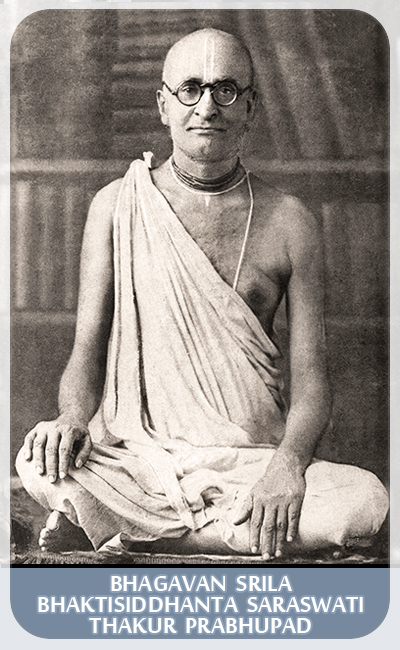Our Disciplic Succession:



|
"The Sun Never Sets on Sri Chaitanya Saraswat Math":
|
| ABOUT US | GUIDANCE | LIBRARY | DAILY PRACTICE | PHOTO | CALENDAR | CONTACT |
THE VOICE OF SRI CHAITANYADEV (Vol 1)
All Glory to the Divine Master
and the Supreme Lord Sri Krishna Chaitanya
(4) Holy Talks
Nitya-lila-pravista
Om Vishnupad Paramahamsa-chudamani
Sri Srila Bhakti Raksak Sridhar Dev-Goswami Maharaj
[July, 1982]
Asvini, Varuni, Kirtika. Kirtika is the name of the third daughter of Daksa. It was a custom in Vraja-mandal to name one’s daughter after one of the daughters of Daksa Prajapati. So the name of Radharani’s mother was Kirtika, and Radharani is called Kartiki, in the sense that She is born from Kirtika. So, regarding the holy month of Kartika, Srila Sanatana Goswami has given the clue: masanam marga-sirso ’ham. Krishna says, “Of all months, the month Marga-sirsa (November–December) represents Me.” Kartika precedes Marga-Sirsa, or Agrahayan. So the Kartika month therefore has some reason to be conceived of as representing Radharani. As Krishna represents Marga-Sirsa, it can follow that the Goddess representing the preceding month, Kartika, represents Radharani. The Kartika month is the month of the vow known as urjja-vrata. ‘Urjjesvari’ is also a name of Radharani. Urjjah means ‘resources.’ All resources culminate in Her. She commands all resources. The sakti, power or resources, are commanded by Her. So the vow followed in the month of Kartika known as urjja-vrata goes ultimately to the connection of Urjjesvari, Sri Radhika, and thus Vaishnavs lay stress upon the observance of Kartika, especially with the aspiration of satisfying Radharani—to attain Her service, and the service of Krishna.
We are also told that in that month the gopis observed the worship of Katyayani, with the internal aim of satisfying the Devi (Goddess). Nanda-gopa-sutam devi patim me kurute namah. That was their internal prayer to the Devi Yogamaya: “Please manage in such a way that we can have the service of the son of Nanda in our own hearty way.” With that prayer, the kartika-vrata was observed by them.
So we also lay some special stress on the observance of the last portion of chaturmasya, known as kartika-vrata. And that is exclusively connected with service of the gopis, Radharani, and Krishna; and Srimad Bhagavatam also comes to encourage us in the line of the gopis’ worship of Katyayani. With that spirit within, we observe the last month of chaturmasya more attentively.
Revealed truth
Vedais cha sarvair aham eva vedyah—srutibhir vimrigyam. Sruti means ‘revealed truth.’ We cannot expect to find any truth here, in this world. This world is all misunderstanding, in the field of provincial and local interest. Beyond that, nothing can be conceived here. So absolute knowledge must come from a quarter other than this world. Revealed truth is our only solace, our only support.
Veda means, ‘Know this.’ Simply, ‘Know’; no rhyme, no reason. When a mother orders her child, she does not offer any reason: “Boy, do this.” There is no rhyme, no reason, no nyaya, sastra (logic or scriptural injunction), or anything of the kind. Similarly, Veda comes with a command, an affectionate command, “Do this—know this. I speak fact. Don’t challenge. Your challenging equipment is all futile and false, so don’t come, my child, to challenge what I say! Please know this!” This is Veda.
Vedais cha sarvair aham eva vedyah: “All the revealed scriptures try to reveal Me alone—I am to be known.”
yasmin jnate sarvam idam vijnatam bhavati,
yasmin prapte sarvam idam praptam bhavati,
tad vijijnasasva tad eva brahma
“You are searching for this and that—this is all futile. Only try to know Me, and everything is known. Your searching life will be finished. There will no longer be any necessity for searching if you can know Me.”
bhidyate hrdaya-granthis chhidyante sarva-samsayah
ksiyante chasya karmani mayi drste ’khilatmani
(Srimad Bhagavatam, 11.20.30)
“Your quest will be fulfilled only when you come to such a stage. Bhidyate hrdaya-granthih: your heart is sealed. That seal will be broken. There is a knot—that will be torn. The flow will come out towards Me. The heart is in bondage. If it is untied, the easy and natural flow will come to Me. The tie is removed and the heart will flow with love towards Me. Chhidyante sarva-samsayah: your searching trouble will be ended. No more search will be necessary. Always searching for better, better, better—that will be ended. Ksiyante chasya karmani: from your previous life, your obligation to the environment will also disappear; mayi drste ’khilatmani: when you will find that I am everywhere. I am the party with whom you have to deal. So, I am the one who can satisfy you wholly.”
Fulfilling the internal necessity
As our Guru Maharaj said, “If there is fire, don’t try to extinguish it and afterwards come to Krishna.” There is no necessity of extinguishing fire. All your internal necessity is with Krishna. But you go to extinguish fire as though you have some necessity with the thing to be burnt? No, no. You have no such necessity. The whole world maybe reduced to ashes—you won't lose anything. All your necessity is in the divine feet of Krishna. He can supply, He can manage. He can give you the fullest engagement, naturally in your serving relationship with Him.
Mayi drste ’khilatmani: “Wherever you cast your glance you will see that I am there. Maybe you want to do good to others? But you will see that I am there; so your attempt to do good is not necessary. I am fully conscious of any benefit. So you can bestow nothing.” He has the best interest and the best liking for everyone. He is there. So all other considerations are cancelled. “There is only you, and Myself. All others are subsidiary.” Of course, this is in a general sense. Then further readjustment comes through Yogamaya, in a serving group. There, another development will arise, where everything is similar but not the same.
Crossing the layer of satisfaction, there is again dissatisfaction:“I am not getting the service of Krishna.” Not a drop to drink—only hankering, hankering, hankering. “How can I get a drop of this nectar to drink?” That will be a further development. And Krishna’s different aspects will be unfolded to our hankering, and we will find infinite love.
Quality vs. quantity
Devotee: Is it true that by practising chaturmasya during the month of Kartika in the holy dham, one receives the benefit of observing the entire four months?
Srila Guru Maharaj: That depends on the quality of observance. One day’s or a second’s observance may cover the whole thing. Intensity and quality must get us relief from the ‘mathematics.’
eka krsna-name yata papa hare
pataki sadhya nahi tata papa kare
“No sinner can commit as much sin as one Name of Krishna can destroy.”
namno ’sya yavati saktih papa-nirharane hareh
tavat kartum na saknoti patakam pataki janah
(Kurma Purana)
Still, we are requested to observe the formalities of taking one thousand Names, one lakh Names, sixteen rounds, etc. These observances are necessary for the lower order. Our attention should nonetheless focus on the quality. One Name can be infinitely more effective than crores of Names if they are only namaparadha or namabhasa (offensive or an indirect, hazy facsimile). This must be discerned.
tunde tandavini ratim vitanute tundavali-labdhaye
karna-kroda-kadambini ghatayate karnarvudebhyah sprham
chetah-prangana-sangini vijayate sarvendriyanam krtim
no jane janita kiyadbhir amrtaih krsneti varna-dyayi
(Vidagdha Madhava, 1.15)
The highest section can never satisfy themselves that they have ‘reached the standard’ of taking the Name—they are paralysed from the beginning. When Yasoda takes the Name of Krishna, or Radharani takes the Name of Krishna, how many ‘volts’ are present there? The magnitude of that voltage is inconceivable to us!
anyabhilasita-sunyam jnana-karmady anavrtam
anukilyena krsnanusilanam bhaktir uttama
(Sri Bhakti-rasamrita-sindhu, Purva 1.11)
Anyabhilasa is the layer of random, fleeting desires or the whims of every individual. Within the relativity of revealed truth, the path of karma which is recommended while catering for our present stage, produces a mixture. A certain percentage of devotion may be present in us, but it is mixed with the objects of this anomalous world.
Then above karma is jnana (knowledge): we can perceive the mortality of this world, so we should not keep any connection with such a world of death; we must rise above it, otherwise we cannot be happy. Both jnana and yoga come forward with this proposal to somehow escape from the difficulty of death. To drive away death should be the be-all and end-all of life, and we must be saved from the clutches of death, the chains of mortality. But all these things are merely to get out of the negative side. The word adi (etc.) signifies yoga and saithilya, our idleness and apathy. And anukulyena-krsnanusilanam indicates ‘not pratikulya’ or ‘not that which is undesirable,’ so cultivation of Krishna means service to Krishna. Our normal relation with our higher existence can only be that of service, not otherwise. So, somehow we must take that path, and progress. To begin with it may be calculative, but it will come to an automatic stage. We will find it within ourselves—spontaneously.
A river of love
This is love, the flow of a river of love. Then service is the service of love. Loving service is its own food, and clothing, and shelter. Everything is there. There is no other necessity outside. Every aspect of our life is engaged, in the entire twenty-four hours. The whole space, time, and the person—all three—are fully absorbed.
The Supreme Lord is rasa, or ecstasy personified, and He has His own group. Refugees come from one land for shelter in another, and the government takes the care to give them temporary shelter in a camp. Gradually, arrangements are made for their place of settlement in a particular district, in a suitable vocation according to their capacity. Similarly, in the absolute plane there are camps of different rasas—sakhya, vatsalya, madhura, etc.—and there are also groups within those, of variegated nature. In this way the fullest adjustment is managed. Proper livelihood is also arranged, that is, engagement, or service. When the refugees are settled, their shelter and engagement or livelihood, are all to be arranged.
yatha yatha gaura-padaravinde
vindeta bhaktim krta-punya-rasih
tatha tathotsarpati hrdy akasmad
radha-padambhoja-sudhambu-rasih
“The more devotion unto the lotus feet of Sri Gaurasundar is attained by the fortunate soul, the more the ocean of nectar—the service of the lotus feet of Sri Sri Radhika—spontaneously wells up within his heart.”
The internal identity of Sri Prabodhananda Saraswatipad (the writer of this sloka) is the sakhi Tungavidya, amongst the eight principal sakhis in Vraja-mandal. She became Prabodhananda in Gaura-lila. His writings are both very sweet and grand, most appealing, and hitting to the mark.
(1) The Divine Service of
Krishna
(2) The Voice of Sri
Chaitanyadev
(3) A Day at Hapaniya
(4) Holy Talks
(5) Living Faith
(6) Sri Dasa-Mula

Download (epub)
Download (pdf)
Sitemap | Contact us | About us
